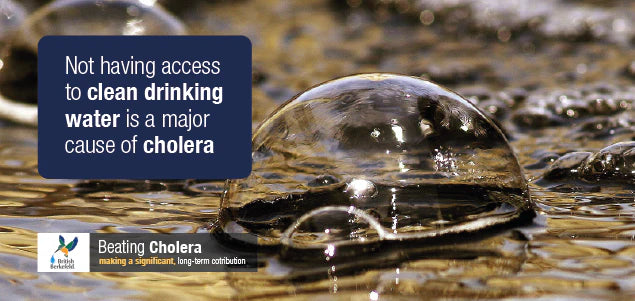In the developed world cholera is seen as a disease of the past - sadly the very opposite is true for some of the poorest parts of the world.
While it has been more than 100 years since the last case of cholera that originated in the UK, Yemen is currently suffering the worst cholera outbreak in history, since modern records began.
A huge reason for its spread is communities not having access to clean drinking water.
As the disease takes hold, those infected further pollute the water supply through poor or non-existent sanitation accelerating the spread of cholera in the area.
The facts are cruel:
- Cholera is entirely preventable;
- It is easily treated, yet tens of thousands of people die from it every year;
- Cholera can kill within hours if not treated;
- Every year there are between 3 and 5 million cases of cholera - and it is believed many more go unreported;
- The mortality rate is 1% in treated cases, but half of those who do not receive treatment will die;
- Young children under five years old are most likely to be affected by cholera;
- Once cholera strikes in a community it spreads rapidly through poor sanitation.
In short cholera is a disease of poverty, it attacks communities where such basic commodities as clean water, medical help and decent sanitation are out of reach.
Tackling a global pandemic
The world is in the grips of a cholera pandemic - and has been since 1961 - with thousands of cases being reported every day in Yemen and outbreaks across sub-Saharan Africa and parts of Asia.
The World Health Organisation has now announced a "roadmap" to tackle Cholera and cut cases by 90 per cent by 2030.
Access to clean drinking water is key to the strategy. Where drinking water is mixed with raw sewage, having access to a is essential. This basic level of prevention is the cornerstone in the fight to halt the spread of cholera.
Using a water filter will remove harmful bacteria that causes diseases such as cholera, E-coli and salmonella.
Emergency water filters bring hope
Charities and organisations worldwide are working to bring clean drinking water to all, introducing simple water filters to communities that are genuinely life-saving, through initiatives such as Give Me Tap
Humanitarian teams also make access to clean drinking water a priority in the wake of natural disasters and at refugee camps.
A complete, low cost, easy to set up filter system - such as British Berkefeld's Household Filter Kit - offers an immediate but lasting solution. These gravity-fed filter systems do not rely on a power supply and can provide clean drinking water quickly and cheaply in emergency situations, helping to halt the spread of cholera and other water-borne diseases.
Products such as these are lightweight, simple to use and effective. Used by aid agencies and charities they bring hope to communities stricken by cholera.
The fight for access to clean drinking water is a daily battle for far too many people - targeting the causes of cholera should help to make a real difference.






